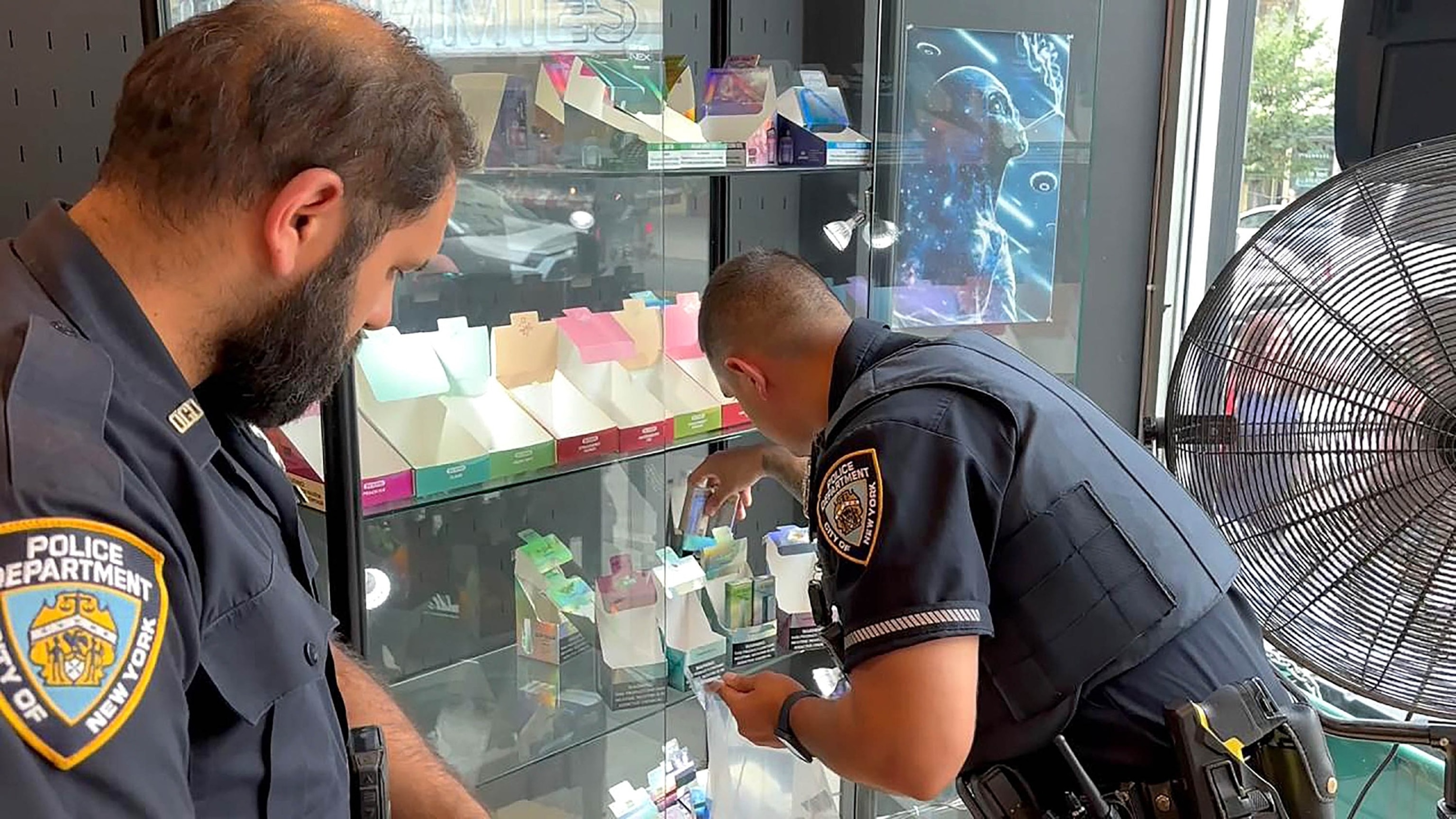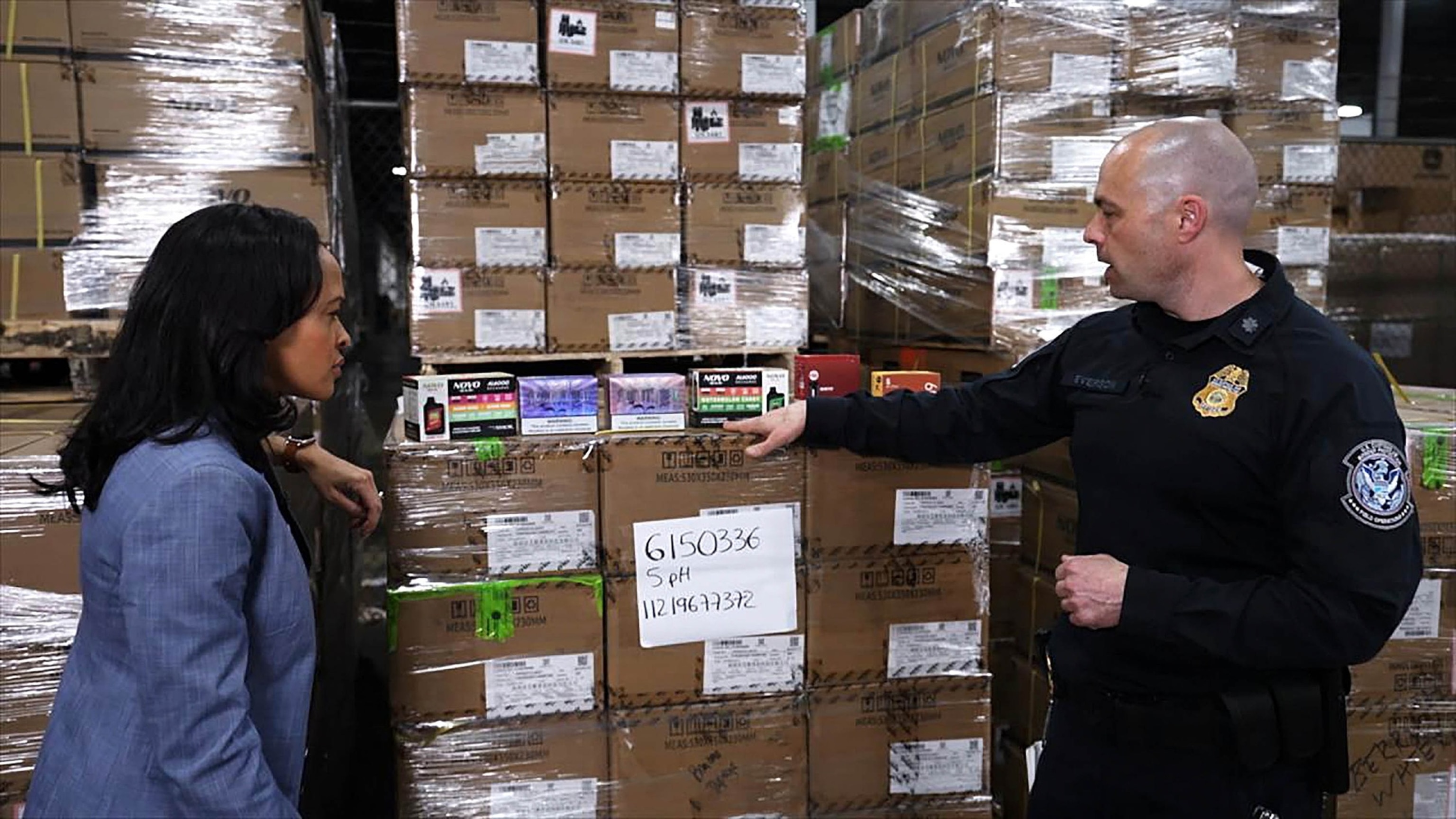

U.S. officials are waging a robust crackdown on a surge of sophisticated illicit vaping products flooding U.S. markets, many of which appear designed to attract teenagers and avoid parental detection, an ABC News investigation found.
The new generation of products, most of which are imported from China, feature vaping mechanisms that are concealed as backpacks, smartphone cases, highlighters and handheld video game consoles, officials said. The products, some of which include LED lighting, Bluetooth connectivity or hidden compartments, allow teens to vape discreetly while attempting to evade parents and teachers.
"So it's very possible the child can go, 'Hey, mom and dad, I want to get these headphones, I want to get this video console,' and the parents unwittingly are buying their child vapes?" ABC News anchor Linsey Davis asked U.S. Customs and Border Protection official Eric Everson.
"That could happen, yes," Everson said.
Federal authorities are treating the deluge of vapes being smuggled into the country as an international threat to America's youth. In 2024, CBP seizures of "Electronic Nicotine Delivery Systems," which include vapes, had a domestic value of $34 million. And in just the first six months of 2025, CBP seizures had a domestic value of $60.3 million.
Despite a ban on flavored vapes, stores across the United States continue to sell cartridges like "pineapple express" and "killer custard blueberry."
In Louisiana, federal agents with the U.S. Bureau of Alcohol, Tobacco, Firearms and Explosives have been seizing vapes hidden in safes, vehicles, and elaborate concealments like trap doors. The agency told ABC News it is seizing "so much product" that officials have had to drastically increase the capacity of the holding facilities where they store seized products.

It's the same situation in Chicago, where 4 million vape sticks sit in a law enforcement warehouse.
"Do you have any sense what kind of percentage this is of all that's out there illegally?" Davis asked Everson regarding the 4 million vapes.
"This is just a small fraction of the seizures we have here," Everson replied.
The vaping industry, which has been around for more than a decade, is currently worth billions of dollars, according to industry experts and law enforcement. The CDC Foundation has found that more than 20 million e-cigarettes are sold in the U.S. each month.
But experts suggest the illicit vaping industry is even bigger, with one think tank estimating that about 240 million illegal vaping devices were sold in the U.S. in 2024.
It's part of an innovation boom, with the U.S. accounting for nearly two-thirds of Chinese vape exports, according to the China Electronics Chamber of Commerce. And although vaping rates among teens have tapered off in recent years, more than 1.6 million American kids reported using vape products in a 2024 National Youth Tobacco Survey.
One ongoing trend among illicit vapes entering the country is that they often feature sugary flavors -- despite a 2020 nationwide ban on flavored cartridges – and sleek, colorful marketing that's geared explicitly toward young people, officials say.
Brian King, a former official at the U.S. Food and Drug Administration, said it's not just the flavors and the packaging used to lure young people, but robust marketing campaigns on popular social media apps.
"It's a variety of factors," said King, who now serves as an executive vice president for the Campaign for Tobacco-Free Kids, an advocacy group aimed at preventing teen tobacco use. "We do know that flavors are enticing to kids, but we also know that they're promoted in channels that can be appealing to kids, including on social media and elsewhere."
According to the FDA, e-cigarettes are the most commonly used tobacco product among youth who reported current tobacco use. In some cases, the nicotine in some vape products is equal to 35 packs of cigarettes, according to experts, making them highly addictive and dangerous to children and young adults whose brains haven't yet fully developed.

This past April, more than two dozen state attorneys general penned a letter asking the Trump administration for its support in "combating the flood of illegal Chinese products -- including illegal Chinese e-cigarettes marketed to minors."
"While we are doing our best to fight the problem in the states, its nature and scope are international," the bipartisan coalition of attorneys general wrote. "President Trump can secure our borders against this influx of dangerous products and hold China accountable for preying on American youth."
Currently, there are 39 total vape products authorized by the FDA -- all tobacco and menthol flavored.
And despite a nationwide prohibition on flavored cartridges imposed by the FDA in 2020, flavored products remain widely available in convenience stores, smoke shops, and online marketplaces across the country. The FDA has issued more than 800 warning letters to retailers for selling these products.
In cities across the country, local law enforcement is cracking down on illicit vapes by going to smoke shops and seizing illicit products.
"It's important, because you have people that are children buying these things," said Sergeant Michael Thorp with the New York Sheriff's Office. "You don't know what's in the product."
Thorp told ABC News during a ride-along to vape shops across New York City that they find illicit vapes everyday.
Despite the progress made by U.S. authorities in curbing illicit vape imports, King warned that a "rapidly dynamic landscape" makes vapes a persistent threat to American youth.
"We can't rest on our laurels," warned King, who said authorities have to keep pace "as the landscape and manufacturers continue to evolve."
"We must ... prevent these products from getting into kids' hands," he said.
